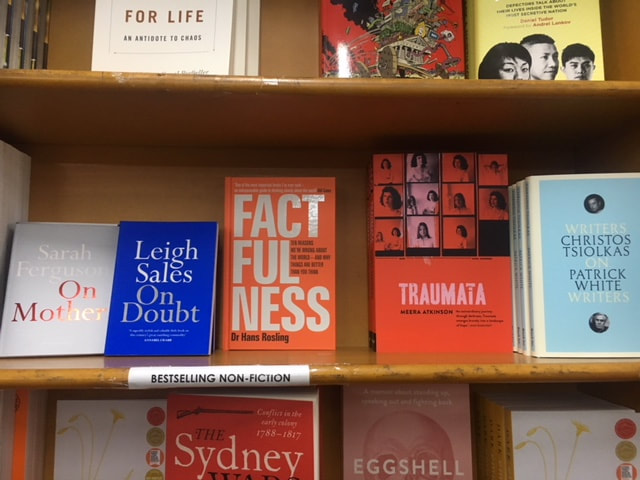|
The Guardian asked me if I had any opinions I'd like to share on book publication day this Monday past. You can read my response here.
As of today, Traumata is in stores and born unto the world. If you live in Sydney, or will be in town on May 20, you're very welcome to come join me 'In Conversation' with Julianne Schultz at Gleebooks. RSVPs required. Sign up here.
I'm honoured to be included in the festival program this year, and what a program it is. New director, Michaela McGuire, has ensured an excellent line up for the temporarily relocated and downsized festival (Carriageworks, Seymour Centre, and other city venues). You can view the program and book events here.
I will be appearing on a panel with Mark Baker and Maria Tumarkin discussing Writing Grief and Trauma, and I'll be facilitating a full-day workshop: Writing Trauma: Exploring Trauma Testimony. I'll also be fangirling around the traps. My forthcoming creative nonfiction title, Traumata, will be published by UQP April 30, 2018. Watch this space for news about associated events.
My academic book, The Poetics of Transgenerational Trauma, was officially launched by Professor Anna Gibbs at the University of Sydney on September 13, 2017. It was a lovely event held in the charming, ye olde John Woolley Building, which houses the English Department. Anna called it an ‘uncannily timely book’ and described it as speaking ‘to the moment, to an urgent and deeply understood present...’ Here’s a Q & A that featured on the Bloomsbury Literary Studies Blog on July 27 to mark the publication of the book.
Q & A with Meera Atkinson Meera Atkinson answered some questions for us about her new book, The Poetics of Transgenerational Trauma. How would you describe your book in one sentence? The Poetics of Transgenerational Trauma explores how literature testifies to trauma transmissions and how certain kinds of writing reveal their social operations and political underpinnings. What drew to you writing about this subject? I was struck by the way family and intimate violence is routinely cast in ahistorical terms as social aberration and ‘tragedy’ while terrorism is routinely politicised. I suspected that there were certain kinds of literary writing capable of exposing feedback loops of traumatic contagion that pass between individuals, families, and collective cultural traumas like war, and my examination of selected texts convinced me that all trauma transmissions are, at root, socially operative traumas, and that literary testimony to them is therefore political in nature in ways not traditionally or sufficiently recognised. How long have you been researching it? How did you come to study it? I began the project in 2010 when I undertook a creative PhD in the Writing and Society Research Centre at Western Sydney University. My entry point was from the perspective of a literary writer engaged in writing a novel that attempted to show how transgenerational trauma transmissions take place (still in progress), and the scholarly aspect of my thesis was based on exploring how other writers did that and on contemplating the agency of that writing. What does your book focus on that hasn’t been explored elsewhere? There are certain questions at the heart of the book such as how does a chronicle of transgenerational trauma reveal the processes of transmission and the historic, collective traumas associated with it? And what might motivate a writer to undertake such a daunting project? Trauma is gendered, raced, classed, economized and otherwise shaped by relations of power. I propose that writing that reveals these operations, demonstrating the effects of trauma transmitted across generations, affords new understandings of the political significance of familial trauma and the cultural conditions that give rise to it, within the context of broader society. What initially drew you to Literary Studies? Well, I’m a literary writer so I’m very interested in how literature works and its place and effects in society. That said, I should stress the interdisciplinary nature of the book. This is not a work of traditional literary criticism. It’s less about formalist analysis and more about identifying traumatic cultural realities the selected works witness to and considering the ways in which the writing reveals them. I viewed this methodology as necessary for approaching the complexities of transgenerational trauma transmissions and the writing they inspire. Which Bloomsbury Lit Studies books have you read? Like every writer/academic, there’s always more on my ‘to read’ list than I get time for, and my interest is primarily in contemporary literature. I realize I’m perhaps biased as we are friends and have co-edited a volume (Traumatic Affect, 2013), but Michael Richardson’s Gestures of Testimony: Torture, Trauma, and Affect in Literature is an impressive book. |

 RSS Feed
RSS Feed